Condoms. Such a controversial issue wherever you go. But here? It's explosive (no pun initially intended, but at this point go wherever your dirty mind takes you). There are so many misconceptions, myths, closely held cultural beliefs and strong opinions about sex in general, HIV, and condoms. Many people, especially in the rural areas, have never even heard of or seen a condom before. Seriously! Convincing people that using condoms is a good idea and can even save their lives when their initial reaction is "you want me to put that where when I am doing what?" is challenging to say the least. During one HIV/AIDS sensitization with SPLA Commanders this Colonel, who could have been anywhere between 40 and 65 years old, picked up a condom, unwrapped it, examined it with squinted eyes like it was a new species of insect, unrolled it, held it up before him and proclaimed: "this is the first time I am seeing this in my whole life."
In my job I talk about sex and condoms and STDs and pregnancy every day. I have become completely impervious to the fact that most people find these topics to be not easily discussed in mixed company and have to constantly remind myself that herpes is not an appropriate happy hour topic. I carry condoms with me everywhere, because it is actually not a rare thing where my team and I are in a meeting with communities and they ask us for condoms.
At first our outreach workers would be chased out of markets for bringing up condoms. Now we can barely get enough stock to meet the demand. Even so, there are serious misconceptions and myths about sex, HIV and condoms in Southern Sudan. And now I present you with a list of the most common ones, in the order of most common, as compiled by our outreach workers and peer educators:
1. Condoms have holes so they do not really protect you
2. Condoms are only for unfaithful people
3. Mosquitoes transmit HIV
4. Condoms come off and get stuck inside a woman and can kill her and the man will be arrested
5. Condoms contain HIV which was put there by the whites to kill Africans
6. Condoms were introduced by Westerners to stop Africans from having more children so they can have more control
7. In order for a condom to work, you must use a male condom together with a female condom
Did you pick up that people here have a touch of conspiracy theorists in them?
Observations from Southern Sudan. Obviously Paradise.
And I am obviously a Petunia.
Peace is a daily, a weekly, a monthly process, gradually changing opinions, slowly eroding old barriers, quietly building new structures. ~John F. Kennedy
Wednesday, February 25, 2009
Thursday, February 12, 2009
Emma's War Cows
The infamous Commander Deng was back at the camp the other day (remember, the one who called me a Khawaja (white) Queen?), just back from a session of the Legislature. His arrival also coincided with 2 things: me feeling under the weather, and an impromptu leaving 'do for a friend who was going for 2 weeks to the UK skiing in Switzerland. Bastard. Half a dozen or so people in the party were getting fairly toasted for a Tuesday night, and one of the women caught the eye of Commander Deng. She got up and tipsily invited him to dance for a few awkward songs. It was like watching a scene from Emma's War unfold right before my eyes: tall, dark haired young English woman with an SPLA General. Spooky.
Anyways, I left, went back to my room, while Simba had to stay longer in order to close the bar. Commander Deng had requested his presence at his table (the man's requests are really demands), which he did for a few minutes. Simba then took his leave by saying "I am sorry sir, I would really like to stay but I will be thrown out of the house if I do not finish cooking for my Queen."
Seriously, where did I find this guy?
The response he received was: "these Kjawaja Queens are very funny. Not like our Sudanese Queens. In Sudan, our women build our houses up around us, cook for us, give us a good time, and have our children. And here you are cooking for your Queen. Very funny."
Sounds like those women are not having as great a time as Commander Deng is. Maybe I should ask one of his 5 wives or one of his 21 children for their opinion. Or I could take the 180 cows he offered the owner of the camp I stay in exchange for me and find out for myself. NOT.

As an interesting aside, that SPLA General in Emma's War is now the VP of Southern Sudan and I play touch rugby with his son who is lovely. You should read the book. Quite a fascinating look at the Southern Sudan conflict's entanglement with the humanitarian relieft effort in the '80's and '90's.
Anyways, I left, went back to my room, while Simba had to stay longer in order to close the bar. Commander Deng had requested his presence at his table (the man's requests are really demands), which he did for a few minutes. Simba then took his leave by saying "I am sorry sir, I would really like to stay but I will be thrown out of the house if I do not finish cooking for my Queen."
Seriously, where did I find this guy?
The response he received was: "these Kjawaja Queens are very funny. Not like our Sudanese Queens. In Sudan, our women build our houses up around us, cook for us, give us a good time, and have our children. And here you are cooking for your Queen. Very funny."
Sounds like those women are not having as great a time as Commander Deng is. Maybe I should ask one of his 5 wives or one of his 21 children for their opinion. Or I could take the 180 cows he offered the owner of the camp I stay in exchange for me and find out for myself. NOT.

As an interesting aside, that SPLA General in Emma's War is now the VP of Southern Sudan and I play touch rugby with his son who is lovely. You should read the book. Quite a fascinating look at the Southern Sudan conflict's entanglement with the humanitarian relieft effort in the '80's and '90's.
Tuesday, February 10, 2009
Jenn Warren
I wanted to give a shout-out to my amazingly talented friend Jenn, who is a freelance photojournalist working here in Southern Sudan. She tends to cover stories about individuals caught up in large movements. Like the mass distribution of over 1,000,000 long-lasting insecticide treated mosquito nets - the first of its kind in Southern Sudan. And the use of dirty syringes in India. And people living in FEMA trailer parks following Hurricane Katrina. And the mass displacement of people following the military operation against the LRA.
You can find here work here. Did I mention her photographs are amazing?
Jenn's work titled "Seeking Shelter" covering the displaced LRA victims in Southern Sudan were also recently featured on a BBC website's "In pictures" segment.
Enjoy!
You can find here work here. Did I mention her photographs are amazing?
Jenn's work titled "Seeking Shelter" covering the displaced LRA victims in Southern Sudan were also recently featured on a BBC website's "In pictures" segment.
Enjoy!
Monday, February 9, 2009
Juba Market Pictures
I am working on designing/producing a nutritional guide for people living with HIV that has pictures of foods they can find in the markets in their own communities, so my team and I spent a few hours traipsing around the market taking photos of various food. Some of them came out beautifully, so here I present to you a tapestry of the Juba Market Foods. Enjoy!
Bananas. Aren't they so small and cute?

Sugar Cane - just hack off a piece with a machete and chew on it to get your sugar fix.

Cooking Oil. Thick and gross.

Cabbages (used instead of lettuce in EVERYTHING)

Avocados - the buttery kind
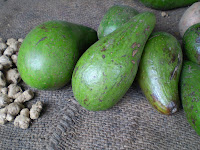
Bread

Tomatoes

Pineapples (always disliked pineapple until I moved to Juba - they taste SO GOOD)

Limes/lemons (depends on who you ask)
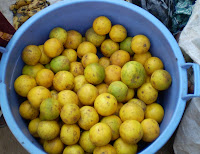
Eggplant

Typical salad. Ok this wasn't from the market, but it's pretty, no?

Dried sardines

Amaranthus (cooked like Spinach) - the dark pink flowers are called Foxtail for those of you in the US.
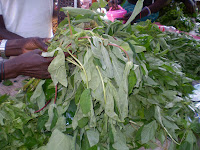
Hard Boiled Eggs (on-the-go snack with a pinch of salt. little girls sell these by carrying them on their heads)
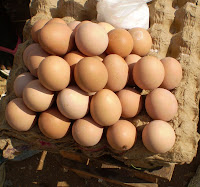
Peanuts (or "groundnuts" as they are called here)

Beans

Honey from Western Equitoria sold in water bottles (notice the bee???)
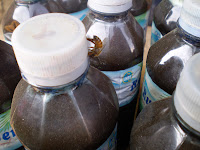
Cassava roots (pounded into a gooey starchy substance and eaten with everything)

Rice

Fish (imported from Uganda - heaven forbid anything actually originate from Southern Sudan)

Bananas. Aren't they so small and cute?
Sugar Cane - just hack off a piece with a machete and chew on it to get your sugar fix.
Cooking Oil. Thick and gross.
Cabbages (used instead of lettuce in EVERYTHING)
Avocados - the buttery kind
Bread

Tomatoes

Pineapples (always disliked pineapple until I moved to Juba - they taste SO GOOD)
Limes/lemons (depends on who you ask)
Eggplant

Typical salad. Ok this wasn't from the market, but it's pretty, no?
Dried sardines
Amaranthus (cooked like Spinach) - the dark pink flowers are called Foxtail for those of you in the US.
Hard Boiled Eggs (on-the-go snack with a pinch of salt. little girls sell these by carrying them on their heads)
Peanuts (or "groundnuts" as they are called here)
Beans

Honey from Western Equitoria sold in water bottles (notice the bee???)
Cassava roots (pounded into a gooey starchy substance and eaten with everything)
Rice
Fish (imported from Uganda - heaven forbid anything actually originate from Southern Sudan)

Labels:
Jubalicious,
oh my god how gorgeous,
Southern Sudan
Badminton and Mental Health
This weekend found us once again on the island in the middle of the Nile - this time for a colleague's birthday. Much more chill than other occasions, and lovely for it. In the course of the conversation the topic of badminton came up. Which turned into a discussion on the practices in different cultures of treating mental illness. More about how those two are related later.
A friend said he was reminded of an African Storytelling event at one of the cafes in his home town where a man got up in front of the audience and detailed his experience in Senegal. He was American, and had been battling depression for many years. This community had their own way of addressing depression, and they invited him to take part.
The whole town turned up for the effort, which included setting up a huge bed in the middle of the town square, and having the man sit on the bed with a goat. Dozens of blankets were piled over the man and the goat making the temperature rise (Senegal is basically on the equator, y'all) making the smell and fear from the terrified goat almost unbearable. The people then started shaking the bed and the blankets, hooting and hollering, drums beating in the background. This went on for about 20 mins after which the man was invited to get down from the bed and have a Coke. "This is the end of Phase I" the village elder informed him.
Phase II included getting back in the bed, under the blankets, with the goat, the same shaking and shouting and drum beating, except now he was expected to kill the goat. Once done, he was taken out, stripped naked, and smeared with the goat's blood. Chickens were also killed and the blood smeared on the man.
And that was it.
To these people, depression was a result not of a chemical imbalance in the brain, but of spirits being pissed off at you for some reason and tormenting you because of it. In order to cure the depression, you had to figure out why the spirits were mad at you, make peace with them, and then ask them to leave. The goat's death represented the spirits leaving the man alone.
After the event, my friend chatted with another one of the storytellers who was from Rwanda, and talked about the efforts of the Western medical system to help the people recover from the genocide in 1994.
"In Rwanda, these Western doctors arrived, and they tried to treat people one by one and in small groups. They brought people inside buildings, bare rooms, harsh lighting, inside away from the sun which makes you feel good, alone and isolated from people they care about, and made them talk about the worst thing that happened to them in their entire life in front of a strange person they did not even know. The Senegalese method makes sense. Think about it. The whole town took off work that day, and came to support this one man, who they did not even know, in order to help him. It was a community event, and everyone was rooting for him. It was outside, and connected to the earth and tangible things to help this man"
Put like that, the storyteller has a point.
Everyone battles their own demons, so to speak, but is a cure dependent on your personality, the specific affliction you have, or your own set of beliefs and values? Do we in developed countries value modern medicine, so it works? Would the same thing work for a genocide survivor in Rwanda? What about people in Southern Sudan who for the past 3 generations have known nothing but war? What do you think?
**********************************
And what was it that connected the conversation about badminton with the mental illness stories? It was the unfortunate name of the rubber-tipped item that gets whacked around in badminton: the Shuttlecock.

Apparently my friend heard the word "shuttlecock" which reminded him of the chickens who played a part in the depression-battling session of the storyteller. The meaning of the chickens? He never found out.
Go figure :)
A friend said he was reminded of an African Storytelling event at one of the cafes in his home town where a man got up in front of the audience and detailed his experience in Senegal. He was American, and had been battling depression for many years. This community had their own way of addressing depression, and they invited him to take part.
The whole town turned up for the effort, which included setting up a huge bed in the middle of the town square, and having the man sit on the bed with a goat. Dozens of blankets were piled over the man and the goat making the temperature rise (Senegal is basically on the equator, y'all) making the smell and fear from the terrified goat almost unbearable. The people then started shaking the bed and the blankets, hooting and hollering, drums beating in the background. This went on for about 20 mins after which the man was invited to get down from the bed and have a Coke. "This is the end of Phase I" the village elder informed him.
Phase II included getting back in the bed, under the blankets, with the goat, the same shaking and shouting and drum beating, except now he was expected to kill the goat. Once done, he was taken out, stripped naked, and smeared with the goat's blood. Chickens were also killed and the blood smeared on the man.
And that was it.
To these people, depression was a result not of a chemical imbalance in the brain, but of spirits being pissed off at you for some reason and tormenting you because of it. In order to cure the depression, you had to figure out why the spirits were mad at you, make peace with them, and then ask them to leave. The goat's death represented the spirits leaving the man alone.
After the event, my friend chatted with another one of the storytellers who was from Rwanda, and talked about the efforts of the Western medical system to help the people recover from the genocide in 1994.
"In Rwanda, these Western doctors arrived, and they tried to treat people one by one and in small groups. They brought people inside buildings, bare rooms, harsh lighting, inside away from the sun which makes you feel good, alone and isolated from people they care about, and made them talk about the worst thing that happened to them in their entire life in front of a strange person they did not even know. The Senegalese method makes sense. Think about it. The whole town took off work that day, and came to support this one man, who they did not even know, in order to help him. It was a community event, and everyone was rooting for him. It was outside, and connected to the earth and tangible things to help this man"
Put like that, the storyteller has a point.
Everyone battles their own demons, so to speak, but is a cure dependent on your personality, the specific affliction you have, or your own set of beliefs and values? Do we in developed countries value modern medicine, so it works? Would the same thing work for a genocide survivor in Rwanda? What about people in Southern Sudan who for the past 3 generations have known nothing but war? What do you think?
**********************************
And what was it that connected the conversation about badminton with the mental illness stories? It was the unfortunate name of the rubber-tipped item that gets whacked around in badminton: the Shuttlecock.

Apparently my friend heard the word "shuttlecock" which reminded him of the chickens who played a part in the depression-battling session of the storyteller. The meaning of the chickens? He never found out.
Go figure :)
Subscribe to:
Posts (Atom)